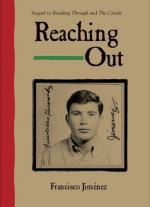|
This section contains 601 words (approx. 2 pages at 400 words per page) |

|
Reaching Out Summary & Study Guide Description
Reaching Out Summary & Study Guide includes comprehensive information and analysis to help you understand the book. This study guide contains the following sections:
This detailed literature summary also contains Topics for Discussion on Reaching Out by Jiménez, Francisco .
The following version of the book was used to create this study guide: Jimenez, Francisco. Reaching Out. Houghton Mifflin Harcourt Publishing Company, New York, New York, 2008. Kindle AZW file.
Francisco Jimenez left home the fall after graduating high school to attend college at Santa Clara University in California. He was the son of a family that supported itself through most of Francisco's childhood on what the family could earn as migrant farm laborers. They were in the country illegally when Francisco was a child, and were deported once. When they returned, legally this time, Francisco and his family still faced extreme poverty and hardships, including racial bias. Because of the need for the entire family to work the crops, Francisco and his siblings missed multiple weeks of school each fall. The late start and the fact that he spoke only Spanish when he began school were difficulties that Francisco struggled to overcome. He earned his way into college and set out to Santa Clara with high hopes.
As soon as Francisco and his family reached the college campus, Francisco was worried. The family car was dilapidated. The driver's side door was tied closed with a rope. Francisco and his brothers hurriedly took his belongings to his dorm room. He watched his parents and siblings drive away with mixed emotions. He worried most about English. Having gotten a late start learning the language, he felt least confident about those classes but felt he could overcome anything with hard work. He registered for classes, including Spanish literature and English, and was quickly working on writing assignments. He got a D on his first English assignment and was morose, feeling for the first time that he might not be capable of earning a college degree. He was surprised when his grades improved right away. Hebegan to feel more confident.
Francisco began to make friendships with a few of his fellow students, though it took some time for him to realize that the social aspect of college was important. He initially spent most of his time studying and avoiding the social events, including ball games. As he begins to make friendships, including several through his roommate, his interests expand. After his freshman year, he begins to expand his interest even more, eventually joining a religious group on campus.
Francisco also began to make friends with several of the professors, and they helped him find ways to pay for his college expenses. Francisco went home every summer and during holidays, and he worked during those breaks from school. Though his own future was far from certain, he continued to offer financial support to his family, giving them most of his earnings. Francisco's father had been disabled for years at this point, and he left the family to return to Mexico. With his absence, Francisco began to feel that he was being selfish by remaining in college. He considered dropping out to get a job and help support them. His professors convinced him that was not the best idea, and he continued his studies. As a senior, he was accepted into a graduate program that would qualify him to teach college. Francisco went home for the summer after graduation, knowing that he would soon be traveling to New York, putting more distance between him and his family than ever.
The autobiography is written in an informal tone with many of Francisco's family members appearing. For clarity and to match the tone of his memoir, most of the characters are referred to by first name only, except those Francisco referred to more formally, such as professors.
Read more from the Study Guide
|
This section contains 601 words (approx. 2 pages at 400 words per page) |

|



